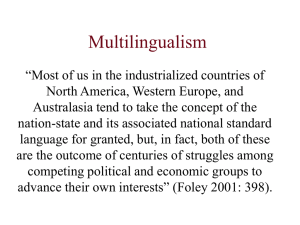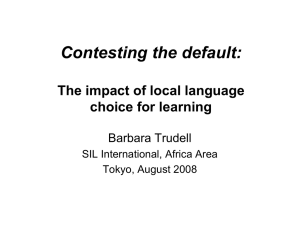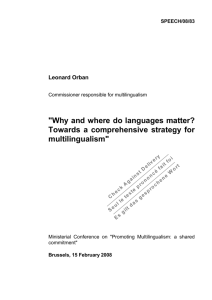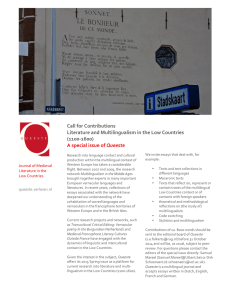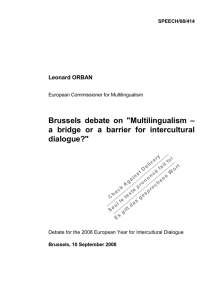Load fact sheet in pdf format
advertisement
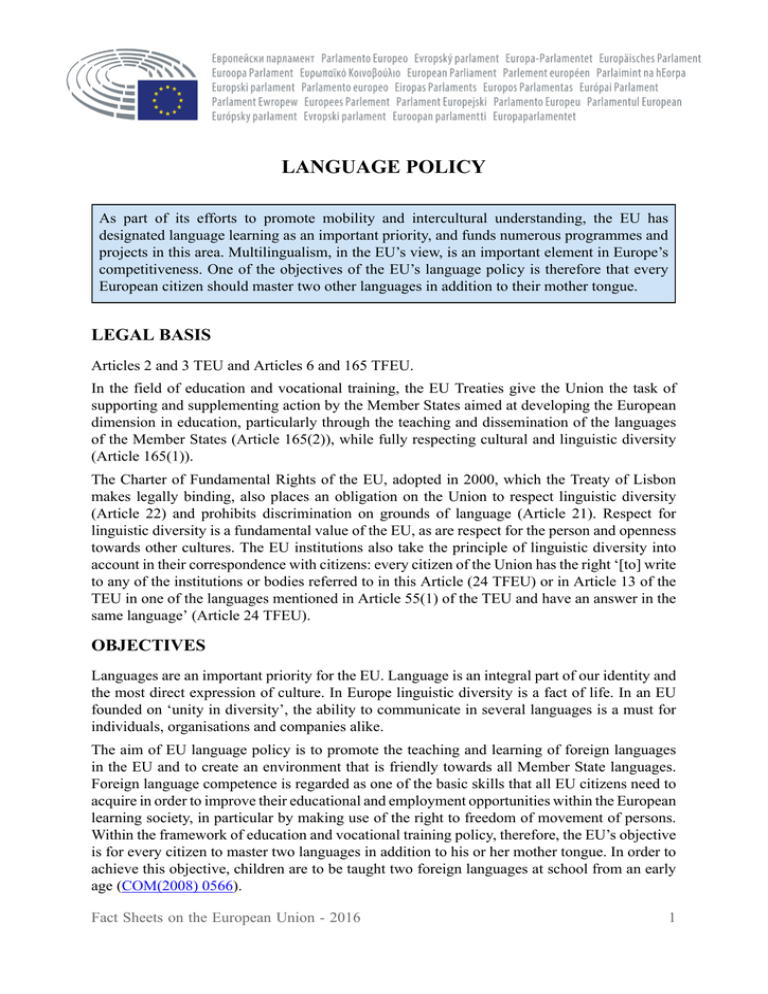
LANGUAGE POLICY As part of its efforts to promote mobility and intercultural understanding, the EU has designated language learning as an important priority, and funds numerous programmes and projects in this area. Multilingualism, in the EU’s view, is an important element in Europe’s competitiveness. One of the objectives of the EU’s language policy is therefore that every European citizen should master two other languages in addition to their mother tongue. LEGAL BASIS Articles 2 and 3 TEU and Articles 6 and 165 TFEU. In the field of education and vocational training, the EU Treaties give the Union the task of supporting and supplementing action by the Member States aimed at developing the European dimension in education, particularly through the teaching and dissemination of the languages of the Member States (Article 165(2)), while fully respecting cultural and linguistic diversity (Article 165(1)). The Charter of Fundamental Rights of the EU, adopted in 2000, which the Treaty of Lisbon makes legally binding, also places an obligation on the Union to respect linguistic diversity (Article 22) and prohibits discrimination on grounds of language (Article 21). Respect for linguistic diversity is a fundamental value of the EU, as are respect for the person and openness towards other cultures. The EU institutions also take the principle of linguistic diversity into account in their correspondence with citizens: every citizen of the Union has the right ‘[to] write to any of the institutions or bodies referred to in this Article (24 TFEU) or in Article 13 of the TEU in one of the languages mentioned in Article 55(1) of the TEU and have an answer in the same language’ (Article 24 TFEU). OBJECTIVES Languages are an important priority for the EU. Language is an integral part of our identity and the most direct expression of culture. In Europe linguistic diversity is a fact of life. In an EU founded on ‘unity in diversity’, the ability to communicate in several languages is a must for individuals, organisations and companies alike. The aim of EU language policy is to promote the teaching and learning of foreign languages in the EU and to create an environment that is friendly towards all Member State languages. Foreign language competence is regarded as one of the basic skills that all EU citizens need to acquire in order to improve their educational and employment opportunities within the European learning society, in particular by making use of the right to freedom of movement of persons. Within the framework of education and vocational training policy, therefore, the EU’s objective is for every citizen to master two languages in addition to his or her mother tongue. In order to achieve this objective, children are to be taught two foreign languages at school from an early age (COM(2008) 0566). Fact Sheets on the European Union - 2016 1 The ‘Education and Training 2020’ strategic framework identifies language learning as a priority. Communication in foreign languages is one of eight key competences needed to improve the quality and efficiency of education and training. In addition to the main skill dimensions of communication in the mother tongue, this includes mediation and intercultural understanding. EU education policies are increasingly driven by the Europe 2020 strategy. In this context, language skills are crucial to the ‘Agenda for new skills and jobs’ initiative, as they enhance employability. They are also a prerequisite for mobility, hence the successful implementation of the flagship initiative ‘Youth on the move’. ACHIEVEMENTS A. Support programmes 1. Erasmus+ Programme Erasmus+, which started in January 2014, is the EU programme for Education, Training, Youth and Sport for 2014-2020. The promotion of language learning and linguistic diversity is one of the programme’s specific objectives. The Erasmus+ Programme Guide states: ‘The opportunities put in place to offer linguistic support are aimed to make mobility more efficient and effective, to improve learning performance and therefore contribute to the specific objective of the Programme. Linguistic support is available for the language used by participants for studying, carrying out a traineeship or volunteering abroad in the framework of long-term mobility activities supported under Key Action 1. Linguistic support [is] mainly offered via the Erasmus+ Online Linguistic Support, as e-learning offers advantages for language learning in terms of access and flexibility.’ The Erasmus+ Programme Guide also states: ‘Under Key Action 2, Strategic Partnerships in the area of language teaching and learning will be encouraged. Innovation and good practice aiming to promote language skills can include for example teaching and assessment methods, development of pedagogical material, research, computer assisted language learning and entrepreneurial ventures using foreign languages. Furthermore, funding for linguistic support can be provided when necessary to beneficiaries of Strategic Partnerships who organise longterm training and teaching activities for staff, youth workers and learners.’ 2. Creative Europe Programme In addition to educational and training programmes, financial assistance for language projects is available under the Creative Europe programme, in which support is provided for the translation of books and manuscripts under the Culture sub-programme. 3. Other support The EU supports the European Centre for Modern Languages (ECML), whose mission is to encourage excellence and innovation in language teaching, and to help Europeans learn languages more efficiently. The ECML’s main aims are to help Member States implement effective language teaching policies by: — focusing on the learning and teaching of languages; — promoting dialogue and exchange among those active in the field; — supporting programme-related networks and research projects. The ECML runs four-year programmes to promote excellence in European language education. Fact Sheets on the European Union - 2016 2 The EU has adopted various measures for the preservation and promotion of regional and minority languages. They include the Mercator European Research Centre on Multilingualism and Language Learning which is part of a network of five research and documentation centres specialising in regional and minority languages within the European Union. Activities for which support was provided also include: — other projects for regional and minority languages such as ADUM (a project offering information on EU programmes relevant for the funding of minority language promotion projects), the Celtic, Regional and Minority Languages Abroad Project (CRAMLAP) and the Network to Promote Linguistic Diversity (NPLD); — sign languages (Dicta-Sign and SignSpeak); — bilingual education (E-content and language-integrated learning (ECLIL)). B. Other EU initiatives 1. Action plan and framework strategy In response to an EP resolution of 13 December 2001 on regional and lesser-used European languages and to a relevant Council resolution (2002/C 50/01), in July 2003 the Commission adopted an action plan on ‘Promoting language learning and linguistic diversity’ (COM(2003) 0449), setting out three areas in which it would be providing funding for short-term action to support measures taken by Member States under existing Community programmes. The three areas are: lifelong language learning; improving the teaching of foreign languages; and creating a language-friendly environment. In 2005 the action plan was supplemented by the new framework strategy for multilingualism (COM(2005) 0596, see above). The results of the action plan at national and European level were summed up by the Commission in a report (COM(2007) 0554) in autumn 2007. This report was intended to serve as the basis for further measures in the field of multilingualism policy. In 2008 the Commission adopted a communication entitled ‘Multilingualism: an asset for Europe and a shared commitment’ (COM(2008) 0566), which laid down a framework for the EU’s policy on multilingualism. The communication called for the mainstreaming of multilingualism throughout all relevant policy areas, reached out to a wide range of stakeholders, and recommended close cooperation with, and among, them. The approach to multilingualism reaches out to new and steadily growing groups of learners who, so far, have only marginally been addressed in this context (school drop-outs, immigrants, students with special learning needs, apprentices and adults). In 2008, too, the Council of the European Union adopted its Resolution on a European strategy for multilingualism, in which it invited the Commission and the Member States to promote multilingualism with a view to strengthening social cohesion, intercultural dialogue and European construction; to strengthen lifelong language learning; to better promote multilingualism as a factor in the European economy’s competitiveness and people’s mobility and employability; to promote linguistic diversity and intercultural dialogue by stepping up assistance for translation, in order to encourage the circulation of works and the dissemination of ideas and knowledge in Europe and across the world; and to promote EU languages across the world. 2. Raising awareness of the importance of foreign languages Encouraged by the huge success of the European Year of Languages (2001), the EU and the Council of Europe decided to celebrate the European Day of Languages every year on 26 September, with all sorts of events to promote language learning. Like the earlier European Year Fact Sheets on the European Union - 2016 3 of Languages, this action is designed to raise awareness among citizens of the many languages spoken in Europe and to encourage them to learn languages. 3. Comparability of data on language competence In 2005 the Commission proposed to the EP and the Council the introduction of a European indicator of language competence (COM(2005) 0356). The framework was set out in a Commission communication adopted on 13 April 2007 (COM(2007) 0184). This indicator is intended to make a substantial contribution to achieving the ‘mother tongue + two’ objective by enabling foreign language competence to be measured in a comparable way in all Member States. The first results of the language survey conducted in 2011 became available in 2012. 4. Online observatory for multilingualism The EU has an online observatory for multilingualism called Poliglotti4.eu[1]. This is a project to promote multilingualism in Europe that resulted from the deliberations of the EU Civil Society Platform on Multilingualism. The project website reports on best practice in language policy and language learning, and provides policymakers, teachers, learners and civil society organisations with a powerful toolkit for benchmarking and enhancing their activities in non-formal and informal education and learning sectors. ROLE OF THE EUROPEAN PARLIAMENT The EP has drawn up own-initiative reports on a number of occasions to give fresh impetus to the development of language policy in Europe. In particular, its resolution of 24 March 2009 on ‘Multilingualism: an asset for Europe and a shared commitment’[2] reiterated the support of the EP for EU policies in the field of multilingualism and linguistic diversity, underlined the numerous benefits of multilingualism, and also identified the need for action in certain areas, calling on the Commission to draw up measures aimed at recognising the importance of, and promoting, linguistic diversity in the EU. In the EP all EU languages are equally important: all parliamentary documents are translated into all the official languages of the EU and every Member of the European Parliament has the right to speak in the official language of his or her choice. On 19 November 2013 the EP adopted the ‘Erasmus+’ and ‘Creative Europe’ programmes. Films, video and multimedia games, documentaries and short films will be eligible for ‘Creative Europe’ support in the audiovisual field. The EP added a specific provision on funding for the subtitling, dubbing and audio description of European films, which should facilitate access to, and the circulation of, European works across borders. On 11 September 2013 the EP adopted a resolution on endangered European languages and linguistic diversity in the European Union[3], calling on the European Union and the Member States to be more attentive to the extreme threat that many European languages, classified as endangered, are experiencing, and to commit wholeheartedly to the protection and promotion of the unique diversity of the Union’s linguistic and cultural heritage. Miklós Györffi 05/2016 [1]http://poliglotti4.eu/php/index.php [2]OJ C 117 E, 6.5.2010, p. 59. [3]OJ C 93, 9.3.2016, p. 52. Fact Sheets on the European Union - 2016 4
